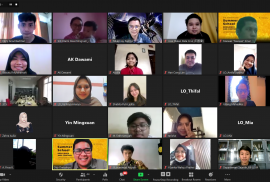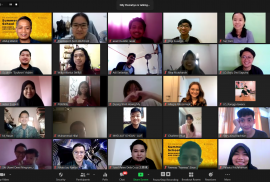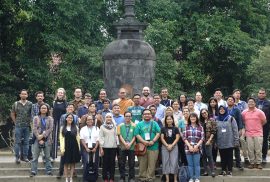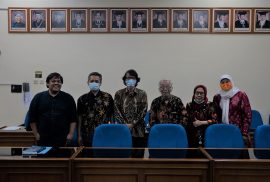The Covid-19 pandemic has been a great shock to humanity. In one night, the world that was busy welcoming the second decade of the 21st century must abruptly close. The economy suddenly plummeted together with the unexpected yet impactful disruption in socio-cultural activities. The government underwent every possible measurement to confine people at their houses or designated quarantine facilities while struggling to provide subsidies for impacted work fields. In confinement, people hardly adjust themselves to the situation while pondering whether humanity could survive this pandemic. Amidst the reflection, a question popped up: the Covid-19 is not the first pandemic in human history. To what extent have we learned from our past experiences dealing with similar issues?
2021
Setelah hampir satu tahun mengalami pandemi, metode pembelajaran virtual seharusnya tak lagi menghalangi. Hal ini dibuktikan oleh Departemen Sejarah UGM yang sukses mengadakan virtual summer school bertajuk “The 3rd International Summer School- Resilience and Control: Transmissible Disease and the Rise of Modern Society.” Virtual Summer School pertama yang diadakan oleh Fakultas Ilmu Budaya UGM sejak pandemi ini berlangsung pada 2-22 Agustus 2021. Acara ini dibuka oleh Kepala Kantor Urusan Internasional UGM, I Made Andi Arsana, S.T., M.Sc, Ph.D yang kemudian dilanjutkan oleh sambutan pembuka dari perwakilan universitas rekanan, Prof. Dr. Kate McGregor dari Melbourne University Australia, dan Kepala Departemen Sejarah FIB UGM, Dr. Abdul Wahid.
__________
Course Title
Resilience and Control: Transmissible Disease and the Rise of Modern Society
__________
Course Description The Covid19 epidemic has reminded all of us of how fragile the relationship between man and nature has always been. Modern society to a significant extent was based on the mythology of the control of nature by man-made science and the reduction of risk of the dangers lurking outside of human civilization. The latest Anthropocene-approach to understanding human and the natural world tend to emphasize human effect on nature. Human civilization became the determiner of a fragile and weak natural system ravaged by the activities of global man. While the discussion on Risk Society also focused on the dangers of civilizations and the running way of technology to the detriment of human society and civilization. The fear always comes from the dangers lurking from within human civilization. This idea of the scientific conquest of the natural world was a central myth of modern society. Yet, just a century ago, the idea of the natural order controlling human fate and civilization had reigned supreme. Capitalism and industrialization had by then expanded to towering heights, producing hellish landscapes of the Satanic mills or the tragedy of the bondage laborers of tropical plantations. Yet these landscapes were rarely seen as taking over nature. The industrialization of the 19th century and the greater human civilization was still seen to be eking its existence on the margins of the natural world. Yet, it was also at this same period in which this gradually changed. In particular, the various technologies that appeared to eradicate transmissible disease and control the pathogenic dangers of nature were afoot. Hygiene and medical biology began to be developed based on the novel idea of the germ theory, the idea that much of the disease that has inflicted humankind was the result of tiny creatures invisible to the naked eye. This hygienic triumph changed so much of how we live, act and think that it is very much probable that the modern world that we know can only be understood to result from the absolute and unassailable control of modern hygiene and modern science. The Covid19 pandemic also alerted us of this towering control of science over the human freedom that we’ve conveniently forgotten. Like Plato’s cavemen, the ropes of scientific controls over our lives and civilizations were suddenly revealed as it was constructed in order to stave us off from the forgotten dangers of pathogens. Instead, we relive our premodern fears of nature and understood once again the fragility of human civilization and the hubris which has made us forgotten the bondage that it created. The exploration between modern society and transmissible disease in this years’ Summer School on Transnational History is not to reinvigorate the old trope of man versus nature, but in fact to understand the entanglements between the biological and the human world. The myth of modern society was exactly rooted, as noted above, in the illusion of carving the natural and the human world as separate spaces. Instead, we look at how transmissible diseases, like all global biological processes, has a way to make us rethink and understand the role of pre-modern human societies, the society before hygienic science and its management retooled society since the early 20th century. Alison Bashford has conducted studies on how various diseases determined different regimes of control based on the current notions of race, gender, and other identities. She saw how ideas of white male masculinities were tied to Australia’s effort to maintain a white society in the tropics. Warwick Anderson on the other hand saw how racial ideas of segregation and differences were applied to the colonial control by Americans in the Philippines. The disease was thus manifestations of behaviors and racial characteristics of the Filipinos. Covid19 alerts us of these synthetic and often nefarious regimes of controls which, on the surface, were thrust to society in the language of science and public policy, but which has always been rooted in the manifestation of the racial, gender, religious and other prejudices. These forms of control were also important in creating the new modern subjects – to be behaviorally controlled into one kind of modern man. He or she would eat in a certain way, move in a certain way and think in a certain way. Thus, the question of scientific conquest of nature seemed less about the natural world than it was about humans. It can also be seen as a scientific conquest of humans and humanity. Yet, there is also another facet to this story. The creation of technology and control of transmissible disease could also provide an empowering opportunity to various societies. The control of disease opened the chance to expand the population, local societies could reclaim and change the behavioral controls of science, and identities always thrived despite the various forms of spatial and behavioral control. Human ingenuity and resilience were not just a lucky component, it was an inherently important one for the success of modern society. It was exactly in human resilience, in its ability to adapt and strategize new ways of living with this control that allowed for the modern hygienic control to succeed. Human efforts to subvert regimes of control represented the continuation of human freedom and the human spirit in the advent of such transcendentally global mechanisms of control. The various technologies of control from public health and hygiene, town planning and architecture, transportation technologies and management of travel, engineering and food science, ideas of morality, identity and new subjectivities and others – reflecting on racial, gender, nationhood and others, represented both the dangers and promises of this new modern society. The similarities of these technologies and how they spread through transnational forms represented the ways in which modern society became increasingly entangled. The exploration of the rise of this society, the entanglement of the local and global within the context of both scientific regimes of control and its interconnection with imperialism, racism, and other non-scientific norms of order, the resilience of various societies in subverting these controls and the empowering effects of these transnational forces represented the core of a human-biological perspective in understanding the rise of the modern world. This is what will be explored in the Summer School of 2021. It is an homage to that scientific world of control that had seemingly died in 2020, but which will continue to live on. Disruption like the Covid19 allows us to rethink the relationship between behaviors, space, and identity in the modern world – who and why are some winners and others lookers in these new strategies of control. It also allows us to see histories in the region and the wider world as transnational and entangled exactly because of the interaction between local societies, global capitalism, and the wider natural world. It is important to understand that this world never ended, these interactions between the global, local, and natural remain the most important relationship of human society. In this regard, we will ponder upon how to deal with these divergent questions in a transnational and entangled way. We will ponder together and share ideas from our own localities in order to see this history as local, national, and transnational processes.
__________
Course Title
Resilience and Control: Transmissible Disease and the Rise of Modern Society
__________
Course Description
The Covid19 epidemic has reminded all of us of how fragile the relationship between man and nature has always been. Modern society to a significant extent was based on the mythology of the control of nature by man-made science and the reduction of risk of the dangers lurking outside of human civilization. The latest Anthropocene-approach to understanding human and the natural world tend to emphasize human effect on nature. Human civilization became the determiner of a fragile and weak natural system ravaged by the activities of global man. While the discussion on Risk Society also focused on the dangers of civilizations and the running way of technology to the detriment of human society and civilization. The fear always comes from the dangers lurking from within human civilization. This idea of the scientific conquest of the natural world was a central myth of modern society. Yet, just a century ago, the idea of the natural order controlling human fate and civilization had reigned supreme. Capitalism and industrialization had by then expanded to towering heights, producing hellish landscapes of the Satanic mills or the tragedy of the bondage laborers of tropical plantations. Yet these landscapes were rarely seen as taking over nature. The industrialization of the 19th century and the greater human civilization was still seen to be eking its existence on the margins of the natural world.
“Peran penting film dokumenter pada masa pendudukan Jepang di Indonesia” menjadi topik bahasan utama dalam webinar yang diselenggarakan oleh Departemen Sejarah FIB UGM pada Rabu, 31 Maret 2021. Dalam diskusi webinar yang bertajuk “Di Bawah Terang ‘Cahaya Asia’: Film Dokumenter di Masa Pendudukan Jepang di Indonesia 1942-1945” ini sukses dihadiri oleh peserta dari berbagai kalangan dan institusi. Dalam diskusi webinar ini hadir Dr. Budi Irawanto sebagai pembicara dan Dr. Abdul Wahid sebagai pembahas. Kemudian untuk mengatur jalannya diskusi yang berlangsung selama 1 jam 30 menit mulai pukul 15.00 hingga pukul 16.30 ini maka turut hadir Julianto Ibrahim, M. Hum selaku moderator webinar.
Pada 23 Maret 2021, Departemen Sejarah, Fakultas Ilmu Budaya, Universitas Gadjah Mada baru saja mengadakan acara peluncuran buku persembahan bagi Prof. Dr. Djoko Suryo dan Dr. J. Thomas Lindblad. Acara peluncuran buku yang berjudul, “Eksploitasi, Modernisasi, dan Pembangunan: Perubahan Sosial Ekonomi Pedesaan Jawa pada Kolonial dan Post-Kolonial” ini dilaksanakan melalui daring dan juga luring dengan mengambil tempat di ruang sidang pimpinan. Pada acara peluncuran buku ini, Prof. Dr. Djoko Suryo yang ditemani oleh istri turut hadir di ruang sidang pimpinan bersama dengan para dosen Departemen Sejarah FIB UGM yang diwakili oleh Dr. Abdul Wahid, M. Hum, M. Phil., Dr. Farabi Fakih, M. Phil., Dr. Sri Margana, M. Phil., dan Dr. Mutiah Amini, M. Hum. Kemudian disela-sela acara peluncuran buku ini juga dilakukan kegiatan sharing dan temu kangen antar dosen lain yang selama masa pandemi sulit untuk melakukan pertemuan tatap muka. (Adit)




